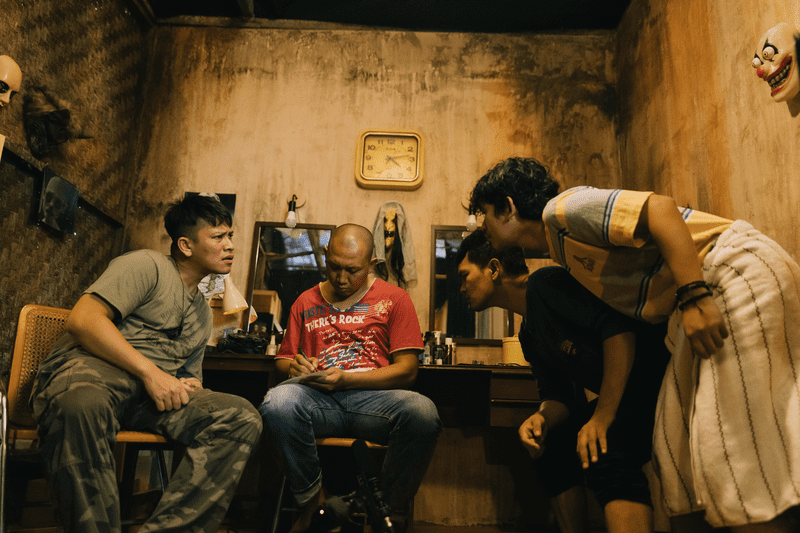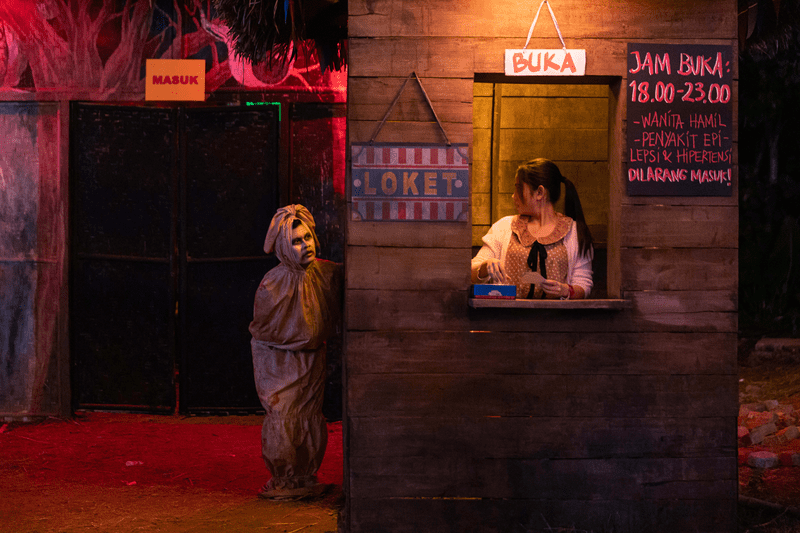Muhadkly Acho’s latest feature pic impressively races for the win only to fall on its knees at the finish line.
This review contains a mild spoiler.
The Indonesian film industry has always had a peculiar relationship with comedy. The most heralded professional jesters in the country — off the top of one’s head: Kwartet Jaya, Srimulat, Warkop DKI — were anointed a Greatest Of All Time (GOAT) status because, in a nutshell, they knew exactly which audience needed laughter the most: The humble, wage-earning, blue-collars.
In many ways, one could tell a lot about a country’s state of mind in a certain period from which brand of comedy resonated with it the most. The early New Order era was a mystifying, if not terrifying, era for the have-nots. Hence, perhaps more than anything else, they longed for a hilarious escapism. It did not matter whether the punch line was witless or downright offensive — all was fair as long as it was funny. Physical comedy and slapsticks were, in particular, the hallowed ground. You could not call yourself a comedian until you learn how to slip on a banana on cue.
A lot has happened in the last half a century, though. The fall of the New Order. The rise of the Reform era. The innovation and, subsequently, penetration of social media. The emergence of the ‘woke’ generation. The COVID-19 pandemic. When all is said and done, hilarious escapism no longer suffices in today’s world, especially at a moment when the lines that separate the haves and have-nots are getting blurrier than ever. An average Joe with a TikTok account could be tomorrow’s star. Conversely, a respectable life could be destroyed with just a single tweet.
Agak Laen stands tall as one of the finest films of 2024 for one simple, yet undisputable reason: Director-writer Muhadkly Acho and his comedians acknowledge that being funny is no longer enough in today’s world — and they are not afraid of accepting the challenge.
Agak Laen follows the story of Bene (Bene Dion Rajagukguk), Boris (Boris Bokir), Jegel (Indra Jegel) and Oki (Oki Rengga) — all of whom are poor and work at a down-on-its-luck haunted house in a village carnival. As the foursome decides to improve upon the haunted house, the accidental death of one of its patrons immediately puts them in a spiral, scrambling for a solution that, hopefully, will not lead to a jailhouse.
Muhadkly Acho goes all out with Agak Laen‘s slapstick humour — and the result is breathtaking. No stones are left unturned as he and his lead quartet spin jokes about bribery, disability, religion, and even social-climbing women. The lead actors, meanwhile, showcase a level of physical commitment that is ballsy as it is standing ovation-worthy, from enacting a slap-off to peeing on a tombstone. All of this could have easily led to disaster or worse, a professional death in the hands of the internet trolls. Fortunately, Acho understands that comedy is, ultimately, a gift for the commoners — not the holier-than-thou, tech-savvy gatekeepers. There is genuine hilarity in life’s tragedies and deformities, so why should anyone take offense to it? Even more so, the fact that Acho and his actors do not discriminate against their comic targets and jabs proves that, if done right, comedy can be a powerful equaliser.
Among everything else, perhaps the shiniest jewel of Agak Laen‘s crown is how the comedy refuses to ‘dumb down’ to reach its intended audiences. Yes, the four leads are being a massive goof, but there is always a clever wink at the end of each punchline. Here Acho argues that ‘slapstick’ and ‘stereotypical’ are two entirely different notions as he accurately depicts the mindsets and the sense of humour of the modern blue-collars. The jokes might not be politically correct, but they are definitely socially thoughtful. Ultimately, the Agak Laen gang does what their comedy legend predecessors failed to do: Embracing change.
Unfortunately, even someone as clever as Muhadkly Acho could not avoid one destructive, stereotypical trait that most Indonesian filmmakers suffer from: Imbuing an unnecessary melodrama. Once the comedy adds a melodramatic subplot to its already mind-blowing formula, all the things Acho has delightfully built since Act One start to dissipate. As talented as they are in comedy, Rajagukguk, Bokir, Jegel and Rengga are not yet seasoned actors, and as it is often cringeworthy to see veteran dramatists try their hands at comedy, the vice versa applies as well. Even more ironically, somehow Rajagukguk’s hysterical deception to his character’s mother speaks louder truth to the heart compared to his Disney-fied profound resolution with his friends.
Perhaps Acho and the Agak Laen troupe also want to acknowledge how, nowadays, the line that separates comedy and drama is getting more blurry as well. It is a noble and creative intention, indeed, but that line exists in the first place for a reason. As blurry as they are in terms of genre, even a novice filmmaker would agree that it requires a different set of skills to pull it off, respectively. Furthermore, Acho, being a comedian himself, should know better that modern audiences nowadays learn more about life from comedy than tear-jerking exhibitionism.
In today’s world, being funny is no longer enough. However, it does not mean a comedian should be something they are not. Change the jokes, sir — not the jester.
Agak Laen is available to watch in theatres across Indonesia.
Photos courtesy of Imajinari Pictures.




